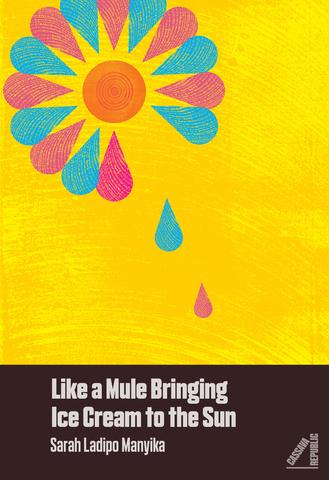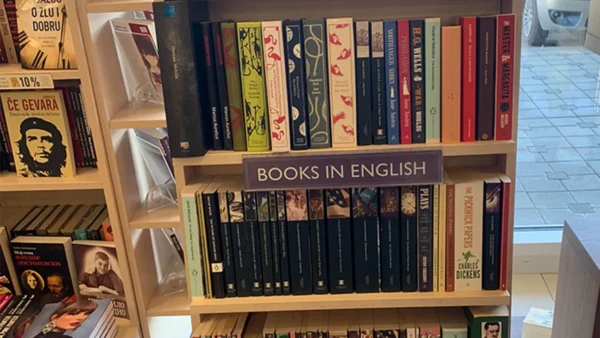I read this book back in the spring, before it got shortlisted for the Goldsmiths Prize and got a fair bit of attention. But, as you’ve probably noticed, I haven’t been blogging very regularly, so I’m only writing about it now.
What I liked about Like a Mule Bringing Ice Cream to the Sun was the way it explored the contrast between the internal and external life of its main character. We all have an internal life, don’t we? A set of memories and desires and fantasies that often don’t bear much relation to the way we’re seen by others. In a way, these are the stories we tell ourselves about ourselves, the running narrative that goes on in our heads 24 hours a day (yes, I think it continues during sleep, just in a less literal, more symbolic form, which is perhaps even closer to the true language of the mind).
The book spends quite a bit of time in the head of Morayo da Silva, a 75-year-old retired English professor, originally from Nigeria and now living in San Francisco. But then it darts out to show us Morayo through the eyes of other characters, sometimes in first person and sometimes in third person.
The effect can be quite jarring, in a good way—it shows us the contrast between self-image and the views of others. While Morayo is smiling flirtatiously at the local store owner, he’s thinking she looks quite odd, and he only gives her a flower because he’s embarrassed at having forgotten her name. When Morayo’s friend Sunshine goes to her flat, she finds it disordered and chaotic:
“Nothing on the shelves is arranged alphabetically, even though several months earlier the two of us had spent a whole day alphabetizing her books. Now, like abandoned children’s toys, I discover many more books tucked away in clothes drawers and cupboards. Nothing seems to be in order, and if I didn’t know Morayo better, I might have wondered at the state of her mind.”
What Sunshine doesn’t realise is that Morayo has her own system—the books, for example, are arranged according to which characters from different books should have the change to talk to each other. The words are carefully chosen—the phrase “like children’s toys” evokes the patronising, infantilising attitude we often take towards older people. Later on, in fact, Sunshine gets someone to clear out a lot of the clutter from Morayo’s home, and he throws out some of her tattered old books. Sunshine thinks she is being helpful, but this is a kind of help reserved for children and the aged—we would consider such an act intrusive with anyone else. Morayo is furious:
“‘Helpful?’ she shouts. ‘But why couldn’t you wait? How could you possibly know what’s important to me and what’s not? That’s my life, Sunshine! My books!”
When you’re 75, I suppose the gap between the internal and external becomes wider. Morayo doesn’t seem to think of herself as an “old woman”, but that’s how people see her, and they judge her and make assumptions about her based on her age.
The conflict between internal youth and external age, in fact, is at the centre of the book. When Morayo slips and injures herself, for example, it’s because she’s balancing on the edge of the bath and twisting her body to look in the mirror at the spot on the back where she’s planning to get a tattoo.
Another aspect of being 75, however, is that your internal life is so much richer, because there’s so much experience to draw on. The most ordinary experiences set off chains of memories and associations for Morayo, and it’s here that the richness of this short novel lies. Through these flashbacks in the course of daily events around San Francisco, the story of a life is gradually revealed.
If you’re looking for a gripping plot full of twists and turns, you won’t find it here. On the surface, nothing much happens at all. But, to me, that’s just the point. Even in lives that seem ordinary, there’s so much going on beneath the surface, things that we often don’t know about. In this rich, meditative novel, we get a fascinating insight into such a life, a moving look at the compromises and disappointments and traumas that contribute to it, and a clever exploration of the occasional collisions of divergent lives and the intersections between past and present.
I’d recommend this book to anyone looking for something a little different, something quieter and more thoughtful than a lot of what’s out there. It’s also one of the first books published by the new UK arm of Nigerian publisher Cassava Republic Press. It’s a great time for smaller independent publishers with all the prizes and shortlisted books recently, and I’m looking forward to reading some of their other books. (As I type this, I realise it sounds like a promo, but it’s not—I bought this book myself and have no affiliation with the publisher. I just like what they’re doing.)
If you want to read something else by Sarah Ladipo Manyika, check out my review of her first novel In Dependence. Wow, was it really seven years ago?




There are 2 comments
Happy new year, Andrew, and I love the new design!
What you’ve said about internal/external life – I hadn’t thought of that and may have to spend some time considering it. One thing I noted in particular is this is a book that might be short and the themes fairly easy to identify but there’s a lot to continue thinking about after you’ve read it.
The part where Sunshine throws the books away is quite powerful. Easy to relate to the horror of it and then everything else surrounding it. Though I definitely focused more on that horror – it’s good to read your commentary.
In Dependence is on my list.
Happy New Year to you too, Charlie! Thanks very much re the design 🙂
You’re right—I found it quite a deceptively simple book. It’s so short and it’s not a ‘difficult’ read in any way, so it’s easy to see it as being quite straightforward. But there’s actually a lot there, and I like books where different people take away different things. I read and enjoyed your review too. It’s definitely a good book for book-lovers. I was distraught when Sunshine’s friend threw the books away 🙂